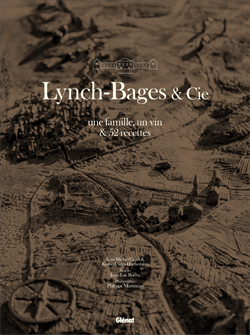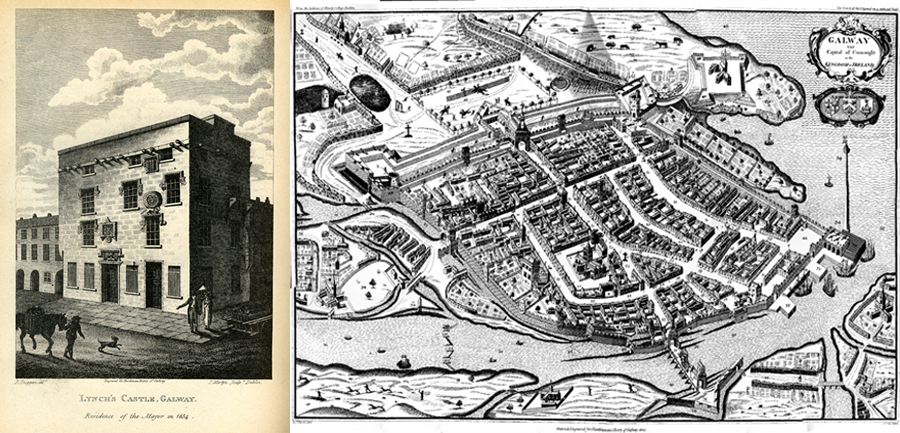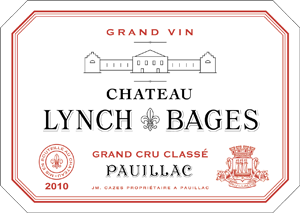The Wild Geese of Galway
From William the Conqueror to Che Guevara, and from Ireland to Bordeaux… Find out more about the Lynch family history at the Saint-Patrick's Day celebrations at Chateau Lynch-Bages.

An extract from Lynch-Bages & Co, a family, a wine and 52 recipes.
To celebrate Saint Patrick's Day on Thursday 17 March 2016, the chef at Chateau Cordeillan Bages, will take us on a gastronomic journey with a distinctive Irish flavour, a tribute to the Lynch family and a saga that started many years ago.
The story began in the late 11th century when Duke William of Normandy, better known as William the Conqueror, was crowned king of England in Westminster Abbey. Meanwhile, some descendants of his companions-in-arms continued their journey westwards, crossing the sea and landing in Ireland.
True to their reputation, they ransacked the country, stopping only when they reached the ocean. There they built the fortified city of Galway, from whence they successfully drove back the native Gaelic natives, the "terrible O’Hara".
The fourteen tribes of Galway
Their descendants, the Galway Tribes, les "Tribus de Galway" - as Cromwell so disdainfully called them - became prosperous merchants who dominated life in the city throughout the Middle Ages. There were fourteen families in all, names among others Kirwan, French, d'Arcy, Martin and Joyce. The most well-known name was Lynch, borne by many of the city's mayors and allegedly acquired from an Austrian family with ties to Charlemagne.

Flight of the Wild Geese
During the Jacobite wars in the 17th century, the Galway tribes naturally sided with Catholic King James II, from whom the protestant William of Orange was trying to wrest the English throne. Crushed at the battle of the Boyne in 1690, thousands of young Irish catholics had no choice but to flee abroad. Hence the "wild geese" took flight and were scattered across the world.
 Ernesto Guevara Lynch
Ernesto Guevara Lynch
The Lynch family fled to Argentina where Jean-Michel Cazes met one of their descendants, today a wine grower in Mendoza. His cousin, Ernesto Guevara Lynch, born in Rosario in 1928, had long hair, a beard and wore a beret. More commonly known by his nickname "Che", his fame reached well beyond his home country. "In my son's veins flowed the blood of Irish rebels", said his father.
In 1961, John Lynch moved to the Chartrons district of Bordeaux, where he fast became a wealthy merchant. He applied for and obtained French nationality, and married a local beauty called Guillemette Constant. A child, Thomas Lynch, was born of their union. Thomas subsequently married Bordeaux aristocrat Elisabeth, daughter of Pierre Drouillard, who was Treasurer General of Guyenne and owned several large wine-growing estates. Their sons, Jean-Baptiste and Michel, both had shining careers. Jean-Baptiste was Mayor of Bordeaux from 1805 to 1819, while Michel Lynch was Mayor of Pauillac and a member of the Council of Five Hundred, the lower house of the legislature under the Directoire.
The Lynch family's loyalty to the crown
Jean-Baptiste was appointed by Emperor Napoleon and served him faithfully... for a few years. In 1814, encouraged by Bordeaux's merchant community - which had grown weary of the economic consequences of war - he became the first magistrate of a French city to take the plunge and swear allegiance to King Louis XVIII.
The grateful new king promoted Lynch to the rank of Pair de France and granted the title of Duke of Bordeaux to Henry, the grandson of his brother, the future Charles X, who was to abdicate the throne in favour of Henry in 1830. The ten-year old Henri V of Artois, Count of Chambord, reigned briefly until he was overthrown by the partisans of Louis-Philippe of Orleans. The Duke of Bordeaux spent his entire life in exile, wandering around Europe from country to country. In 1851, he finally settled at Frohsdorf Castle in Austria where, in memory of his loyal partisans, he was known to entertain his guests with wine from Lynch-Bages.

The fleur-de-lis on the Chateau Lynch-Bages label symbolises the Lynch family's royalist faith and its allegiance to the throne.
This year, the Saint Patrick's Day celebrations will take place in Bages on 17 March. They will kick off at 11:30 with a "Portrait" tour (in French or English) of Chateau Lynch-Bages, which belonged to the Lynch family from 1749 to 1824. The visit will end with a tasting of some of the estate's finest wines. Saint-Patrick's Day lunches will be served at both Château Cordeillan-Bages and Café Lavinal.
Find out more and reserve your place.